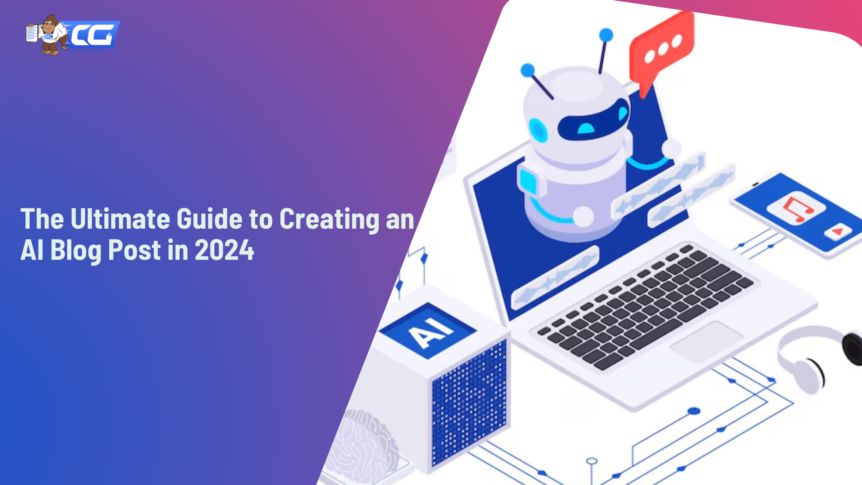Artificial Intelligence (AI) has become a game-changer, especially in content creation. Writing blogs, which used to take hours of human effort, is now being transformed by AI. With AI for blog posts, the process has become faster, allowing for the rapid generation of high-quality content.
Source: Freepik
As AI continues to advance, it is revolutionizing how content is written. It also offers a glimpse into the future where technology and human creativity merge. Let us explore the different aspects of an AI blog post and also discover some tips on how you can use AI to craft content.
What Is an AI Blog Post?
Source: Freepik
AI in blogging refers to the use of advanced algorithms and machine learning techniques to generate content. This technology enables the creation of blog posts in minimal time without compromising the quality. The speed at which AI writes the content is often unattainable by human writers.
It is important to note that AI in blogging isn’t just limited to writing. It can help in editing your content by checking the grammar and sentence structure. Moreover, AI assists in ensuring that the used tone is consistent throughout the blog post.
Some AI tools can also evaluate reader feedback and engagement. This helps them to redefine their content and make future blog posts better aligned with the interests of your audience.
How Is an AI Blog Post Created?
Source: Freepik
The process of AI blog post creation starts with inputting a blog topic or keywords in a blog post generator. The AI tool then generates relevant content based on this input.
This process involves AI tools analyzing vast amounts of data. It includes evaluating existing online content, trending topics, and articles fed to the model during its training. This helps AI in generating accurate and engaging content for your blog posts. Afterwards, AI algorithms can structure the content logically, and even optimize it for search engines.
There are some great content creation tools out there that use the latest AI technologies. One such example is the Blog Post Idea Generator which works best if you want to find engaging topics and ideas for your blog. This tool can help you find the right blog ideas so you can create content that is educative and inspiring for your readers.
Other tools like the Outline Generator are easy to use and perfect for creating outlines and structure for your personal blog. With this tool, you can generate outlines for diverse blog topics and then use them as a guide to craft content effortlessly.
How to Write a Blog Post Using AI?
Let’s look at a few tips on how you can craft the perfect content by using blog post AI tools.
1. Choose your topic and keywords.
To start, you should select the desired topic for your blog post. You can use AI tools to research trending blogs and keywords. This will help you in creating content that is relevant to your industry, niche, and audience.
2. Generate an outline.
Next, create an outline for your blog post using an AI-powered free content generator. All you have to do is to input your topic and keywords. Afterward, the AI will suggest headings, subheadings, and key points to cover.
3. Create the content.
With the outline as your guide, you can now use the AI tool to generate content. AI can help you craft an introduction, body paragraphs, and the conclusion for your post. You can even use AI to tailor the tone and style of your content to align with your audience’s preferences.
4. Optimizing for SEO.
Many AI tools can also assist in optimizing your blog post for search engines. They can suggest relevant keywords, analyze the readability, and even provide meta descriptions. This ensures that you’re creating relevant yet high-ranking content.
5. Edit and proofread.
It is important that you review the AI-generated content carefully. You may check the content to ensure accuracy, clarity, and consistency. Usually, AI doesn’t make grammatical mistakes but it still helps to recheck once. Also, do remember to check the flow and relevancy of your content.
Differences Between Human-Generated and AI-Generated Blog Posts
Source: Freepik
AI-generated content is much faster, but is it as accurate as human-written content? Let’s explore more!
1. Efficiency
AI Generated Content: AI can produce content quickly and increase productivity. Hence, AI tools can save you valuable time.
Human Generated Content: Human writing is slower and requires more time for research. Also, humans often need breaks during work which can affect their output.
2. Creativity
AI Generated Content: AI tools often struggle with creativity. They rely on existing data and figures. This limits their creative thinking.
Human Generated Content: Humans are far better when it comes to creativity. They can think outside the box and provide unique insights.
3. Consistency
AI Generated Content: AI tools maintain a consistent tone and style. The AI’s algorithms ensure uniformity in language and structure.
Human Generated Content: Humans may struggle with consistency. This happens especially in longer formats. They may be influenced by factors such as time limitations or a lack of focus.
4. Emotional Depth
AI Generated Content: AI lacks the ability to genuinely express emotions. Hence, AI blog posts can miss the depth of feeling that human writing can reflect.
Human Generated Content: Humans can perfectly infuse their writing with emotional depth. This helps their article writing for websites to resonate more with their readers.
5. Scalability
AI Generated Content: AI has the ability to manage large volumes of content at once. Thus, AI tools are ideal for creating content in bulk quickly.
Human Generated Content: Humans’ ability for content creation is limited by energy and time. They find it challenging to scale up production without compromising on quality.
6. Contextual Understanding
AI Generated Content: AI may not always understand the context of the content. This often leads the AI blog post to lack relevance for its audience.
Human Generated Content: Humans can easily understand data in a broader context. They can relate data to current trends and events. This often helps them to write content with a more relevant perspective.
7. Data Integration
AI-Generated Content: AI is widely known for integrating data from various sources. It has the capability to process large datasets and extract information. This includes statistics, facts, and historical data.
Human-Generated Content: Integrating diverse data can be challenging for humans. They can not extract information from databases to the extent that AI technologies can.
FAQs
- Are AI blog posts useful?
AI blog posts are quite useful for generating content quickly and efficiently. They can cover a wide range of topics and styles. This helps AI to craft content tailored to different audiences.
- Can Google detect AI-written blogs?
To some extent, Google’s algorithms can detect AI written content. These algorithms look for patterns and trends that are often found in AI content. Although not foolproof, Google’s AI detection is improving with time.
- What is the best AI content generator?
The best AI content generator depends on specific needs and preferences. Some great options include CGAI’s Blog Post Idea Generator and Outline Generator.
Final Thoughts
Creating high-quality content has become much faster and easier with the help of AI. Although AI tools have their pros and cons, they are all set to transform the content creation industry. Explore these AI tools for yourself to craft AI-powered content for your AI Blog Post confidently.
If you are searching for the right ideas for your AI Blog Post, our Blog Post Idea Generator is the ideal fit for you. Check this tool now and craft content that captivates your audience!

I am a full-time online marketer, for over a decade now. Helped over 100,000+ people & generated well over $12M in online sales.

